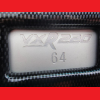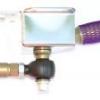
Hub Carrier Bolts And Toe Links - Service Requirement - Important For
#21

Posted 03 February 2017 - 06:33 AM
#22

Posted 03 February 2017 - 07:25 AM
#23

Posted 03 February 2017 - 08:13 AM
Would stainless be an option?Yup. Certainly are, i think the black ones are buggers for rusting.
#24

Posted 03 February 2017 - 08:53 AM
Hi stainless is not strong enough for this application even higher grade a4-80 is only roughly equivalent to a normal 8.8 steel boltWould stainless be an option?Yup. Certainly are, i think the black ones are buggers for rusting.
Edited by ukcat, 03 February 2017 - 08:56 AM.
#25

Posted 03 February 2017 - 08:58 AM
Where do you get the right grade bolts from?
I had a 10.9 HCB snap on me when I went though a major pothole at high speed (which also bent a back wheel by 1"). So I switched to 12.9 steel bolts (which you can buy from most decent hardware outlets). These allow you to safely increase torque by about 20%. Be sure to clean the upright threads.
M10 Eg: http://www.ebay.co.u...vZQT8SoOxDhjDig
Edited by Nev, 03 February 2017 - 09:15 AM.
#26

Posted 03 February 2017 - 09:33 AM
I would suggest reading this also for advice on torque settings:
http://www.vx220.org...437-hcb-torque/
#27

Posted 03 February 2017 - 09:36 AM
Where do you get the right grade bolts from?
I had a 10.9 HCB snap on me when I went though a major pothole at high speed (which also bent a back wheel by 1"). So I switched to 12.9 steel bolts (which you can buy from most decent hardware outlets). These allow you to safely increase torque by about 20%. Be sure to clean the upright threads.
M10 Eg: http://www.ebay.co.u...vZQT8SoOxDhjDig
Thanks for the link - I'm about to order some 12.9 bolts - what is the length?
#28

Posted 03 February 2017 - 10:14 AM
Where do you get the right grade bolts from?
I had a 10.9 HCB snap on me when I went though a major pothole at high speed (which also bent a back wheel by 1"). So I switched to 12.9 steel bolts (which you can buy from most decent hardware outlets). These allow you to safely increase torque by about 20%. Be sure to clean the upright threads.
M10 Eg: http://www.ebay.co.u...vZQT8SoOxDhjDig
Thanks for the link - I'm about to order some 12.9 bolts - what is the length?
The length will vary depending on how many camber spacers you have installed and also 2 of the bolts need to be shorter than the others due to the way the uprights are machined. A 40 to 70 CM selection would probably suffice.
#29

Posted 03 February 2017 - 10:44 AM
If people are fitting the revised standard 10.9 ones, here are the part numbers/lengths etc:
[color=rgb(40,40,40);font-family:helvetica, arial, sans-serif;]Bolt, 10.9 grade, M10x40, steering arm to hub carrier A117W7211F 2 off[/color]
[color=rgb(40,40,40);font-family:helvetica, arial, sans-serif;] [/color]
[color=rgb(40,40,40);font-family:helvetica, arial, sans-serif;]Bolt, 10.9 grade, M10x60, steering arm to hub carrier A117W7212F 2 off [/color]
[color=rgb(40,40,40);font-family:helvetica, arial, sans-serif;]Bolt, 10.9 grade, M10x50, rear ball joint plinth to hub carrier A117W7213F 4 off [/color]
Torque setting for the 10.9 bolts is 68NM.
Additonally, from the Lotus service manual it states:
[color=#565656;][font="verdana, sans-serif;"]On final assembly, Permabond A130 thread locking compound (A912E7033V) should be applied to the bolt thread following package instructions, before fitting and torque tightening.[/color][/font]
Edited by Raptor, 03 February 2017 - 10:47 AM.
#30

Posted 03 February 2017 - 10:56 AM
if when anybody goes to replace them and they look like the original bolts, stop and book it into your friendly vx specialist. Or like me spend weeks cursing and spraying and then book it into your friendly vx specialist.
#31

Posted 03 February 2017 - 11:27 AM
HOLD ON!
I have to go out for an hour or so but I will get back to this thread as soon as I return.
Please do not use 12.9 bolts they will not help and may cause a failure.
I will explain why later.
![]()
Gaz
#32

Posted 03 February 2017 - 12:13 PM
Just be carefull here - did lotus actually change to 12.9 ????. I have only ever seen 10.9 used for this application. Are you aware that the 12.9 will have lower impact strength (I.e more brittle) this means they are not as resistant to shock as the lower 10.9 bolts I am unsure of actual values of the differences between the two but I think it is something that should be taken into accountI had a 10.9 HCB snap on me when I went though a major pothole at high speed (which also bent a back wheel by 1"). So I switched to 12.9 steel bolts (which you can buy from most decent hardware outlets). These allow you to safely increase torque by about 20%. Be sure to clean the upright threads. M10 Eg: http://www.ebay.co.u...vZQT8SoOxDhjDigWhere do you get the right grade bolts from?
#33

Posted 03 February 2017 - 12:30 PM
Just be carefull here - did lotus actually change to 12.9 ????. I have only ever seen 10.9 used for this application. Are you aware that the 12.9 will have lower impact strength (I.e more brittle) this means they are not as resistant to shock as the lower 10.9 bolts I am unsure of actual values of the differences between the two but I think it is something that should be taken into account
I had a 10.9 HCB snap on me when I went though a major pothole at high speed (which also bent a back wheel by 1"). So I switched to 12.9 steel bolts (which you can buy from most decent hardware outlets). These allow you to safely increase torque by about 20%. Be sure to clean the upright threads. M10 Eg: http://www.ebay.co.u...vZQT8SoOxDhjDigWhere do you get the right grade bolts from?
Nope, I don't think Lotus suggested 12.9.
Yep, 12.9 is certainly harder and more brittle and hence more likely to shear rather than bend. However, my experience with 10.9 bolts showed that they could stretch under severe conditions. Once stretched they will fail (regardless of steel grade) as happened on my car. So my conclusion was to switch to a higher tensile steel, add +20% torque on the bolts and try to avoid the stretch risk in the first place (by increasing the friction between the 2 mating surfaces).
I've had 12.9 bolts in my uprights for about 3 or 4 years now, and (touch wood) I've not had a problem yet, and they they do get hammered on some of the roughest undulating roads.
A couple of other people have used 12.9 with no problem too, though the sample rate is clearly not comparable to the number of people still on original(!) 8.8 bolts and 10.9 bolts.
Really and truly those 2 bolts should have been M12 IMO, however there isn't a great deal of "meat" on the castings to retrospectively drill and tap them (if I remember correctly).
An additional thing that people could do is rough up the mating surface of any camber shims put in. I bought some shims from EP and found them to be super shiny and smooth which struck me as rather stupid. So I applied a file and some grit paper to them in an effort to increase the friction.
Edited by Nev, 03 February 2017 - 12:44 PM.
#34

Posted 03 February 2017 - 02:21 PM
OK sorry about the delay.
Lots of reasons not to use 12.9 and even to remove them if you have.
Lets wind back the story a little as some on here are very knowledgable but others not so much.
If it was a good thing to have higher spec steel/heat treatment for bolts without any consequences then it is obvious 5, 8, 10 spec bolts simply would not exist.
The trade off with high tensile strength is a reduction in ductility that leads to bolts to become brittle, these bolts can accept a higher clamping load but if exceeded will tend to snap as they have nothing in reserve, a lower spec material will stretch past the point of elesticity before failing and this will be seen as an elongated bolt, as the clamping force is now reduced this also allows the two mated components to move against each other which may introduce additional shear moments onto the bolt.
So yes, they are stronger but if you clump something hard you are much more likely to cause a single event catastrophic failure.
This is why you rarely see 12.9 spec bolts in the automotive industry outside of racing where the reduced bolt size of a high spec fastener saves a lot of weight, but these are checked very regularly and the bolt spec was incorporated into the original design unlike retro fitting.
The other REALLY important point is bolts do not work by themselves, they work in unison with either a nut or a threaded section, as the force (torque) applied with a 12.9 compared than 8.8 is so much greater it should be obvious that the other component should be as capable as the bolt itself. This is why nuts are also graded, we use 10 spec nuts mostly for the kits as an example.
So by fitting a 12.9 spec bolt into the VX upright it is not too hard to imagine that you have already considerably reduced the margin towards failure of the uprights threadwork and now run the risk that should the material give, you now have a very hard component moving around inside a much softer material. As the tension has been reduced from the bolt it is now much stronger in shear and will easily chew up the upright material with it's nice and hard, sharp edges.
Bolts kits cost £10, uprights are not so cheap.
Lotus upgraded the bolts from 8.8 to 10.9 for a good reasons but they also would have carried out extensive testing to prove the uprights could cope.
At the end of the day they are your cars and your decisions but I think it is not a good way to solve a problem.
If you are having issues with 10.9 bolts then it may be worth looking more widely at the issue: -
Is your torque wrench good quality and tested recently?
Where did you get the bolts from? hopefully not eBay.
Have you checked both surfaces of the upright and ball joint carrier to see if they are perfectly flat?
have you checked the upright threads for damage or distortion?
Where is the problem front or rear or both?
We put some 10.9 HCB kits together last year for a customer and we sell these pretty cheaply as they are a safety item, they are top quality UK sourced and certificated, after plating they are tested for embrittlement and are the same quality bolts we use in the kits, a set of 8 bolts of the CORRECT size are £7 plus postage of choice and vat.
If you think having to highlight CORRECT should be unnecessary I'm sure someone on here will tell you an interesting story ![]()
#35

Posted 03 February 2017 - 02:43 PM
10.9 it is. enough said thanks.
#36

Posted 03 February 2017 - 04:41 PM
OK sorry about the delay.
Lots of reasons not to use 12.9 and even to remove them if you have.
Lets wind back the story a little as some on here are very knowledgable but others not so much.
If it was a good thing to have higher spec steel/heat treatment for bolts without any consequences then it is obvious 5, 8, 10 spec bolts simply would not exist.
The trade off with high tensile strength is a reduction in ductility that leads to bolts to become brittle, these bolts can accept a higher clamping load but if exceeded will tend to snap as they have nothing in reserve, a lower spec material will stretch past the point of elesticity before failing and this will be seen as an elongated bolt, as the clamping force is now reduced this also allows the two mated components to move against each other which may introduce additional shear moments onto the bolt.
So yes, they are stronger but if you clump something hard you are much more likely to cause a single event catastrophic failure.
This is why you rarely see 12.9 spec bolts in the automotive industry outside of racing where the reduced bolt size of a high spec fastener saves a lot of weight, but these are checked very regularly and the bolt spec was incorporated into the original design unlike retro fitting.
The other REALLY important point is bolts do not work by themselves, they work in unison with either a nut or a threaded section, as the force (torque) applied with a 12.9 compared than 8.8 is so much greater it should be obvious that the other component should be as capable as the bolt itself. This is why nuts are also graded, we use 10 spec nuts mostly for the kits as an example.
So by fitting a 12.9 spec bolt into the VX upright it is not too hard to imagine that you have already considerably reduced the margin towards failure of the uprights threadwork and now run the risk that should the material give, you now have a very hard component moving around inside a much softer material. As the tension has been reduced from the bolt it is now much stronger in shear and will easily chew up the upright material with it's nice and hard, sharp edges.
Bolts kits cost £10, uprights are not so cheap.
Lotus upgraded the bolts from 8.8 to 10.9 for a good reasons but they also would have carried out extensive testing to prove the uprights could cope.
At the end of the day they are your cars and your decisions but I think it is not a good way to solve a problem.
If you are having issues with 10.9 bolts then it may be worth looking more widely at the issue: -
Is your torque wrench good quality and tested recently?
Where did you get the bolts from? hopefully not eBay.
Have you checked both surfaces of the upright and ball joint carrier to see if they are perfectly flat?
have you checked the upright threads for damage or distortion?
Where is the problem front or rear or both?
We put some 10.9 HCB kits together last year for a customer and we sell these pretty cheaply as they are a safety item, they are top quality UK sourced and certificated, after plating they are tested for embrittlement and are the same quality bolts we use in the kits, a set of 8 bolts of the CORRECT size are £7 plus postage of choice and vat.
If you think having to highlight CORRECT should be unnecessary I'm sure someone on here will tell you an interesting story
Fantastic explanation, what torque would you suggest OEM or higher in the 10.9 case ?
#37

Posted 03 February 2017 - 05:10 PM
#38

Posted 03 February 2017 - 05:17 PM
It is very important that all critical bolts are correctly torqued.
For legal reasons you should look in the manual for the suggested torques if you are using OE bolts, these are black so a different torque may apply.
But for the plated bolts we supply with the kits as well as the HCB bolts we suggest 45nm for the M10 8.8 bolts and 65nm for the M10 10.9 bolts.
If you plan to use a thread lock just check with the manufacturer about setting torque changes.
![]()
#39

Posted 03 February 2017 - 05:31 PM
#40

Posted 03 February 2017 - 08:42 PM
1 user(s) are reading this topic
0 members, 1 guests, 0 anonymous users





















